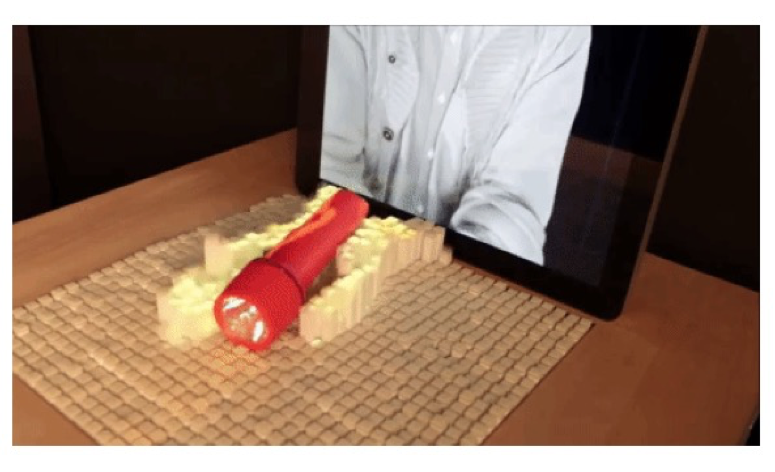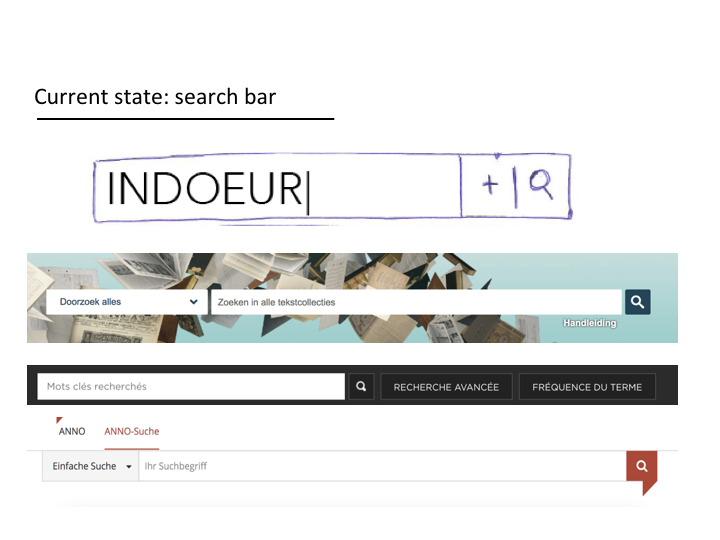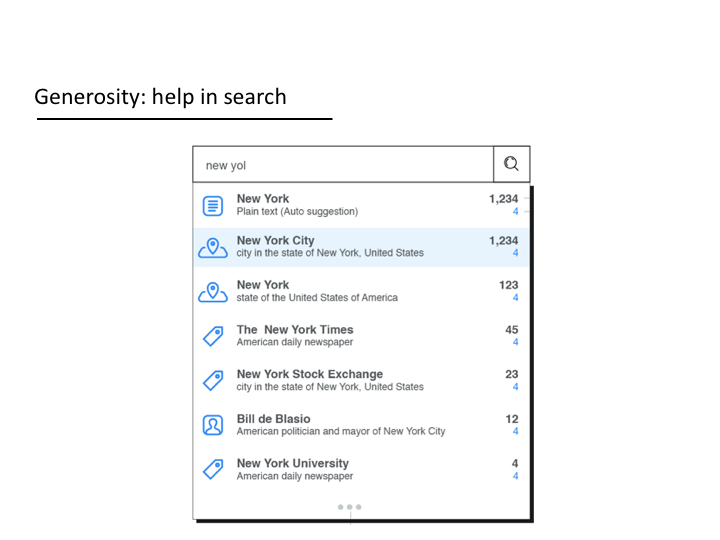This second Impresso workshop aimed at discussing the ongoing research of the C2DH researchers with digitised newspapers and to identify overlaps with the Impresso project. After a short presentation from the Impresso team on the aims of the project, Chris Morse invited participants to “look to the future” with a selection of interface functions illustrated by science-fiction scenes. Each participant was asked to give a short overview of his or her experience in using newspapers for historical research, with an emphasis on their methods.

Example of a look into the future with a tangible interface
The participants had previously received five scenarios devised with the aim of structuring the discussions around key epistemological issues:
Scenario 1: diachronic search
How to follow a topic over time (and space)
Examples:
- The changing treatment of domestic violence in court reports in Switzerland (1900-1945)
- Public discussion on terrorism in Europe (1870-1918)
Scenario 2: ripple effects (text re-use)
How to follow a particular text (idea) through various titles and issues, using plagiarism detection tools
Examples:
- Public communication (press release) on mergers and acquisitions in the steel industry in Luxembourg (1900-1918)
- The League of Nations’ position on cross-border gun trafficking before 1939
Scenario 3: creation of a digital corpus
How to gather a series of issues/segments or issues/titles according to a specific question/topic
Examples:
- Readers’ letters complaining about pollution in cities (1918-1939)
- The emergence of the sports (or culture) section in the press in Luxembourg
Scenario 4: dissemination of an event
How to follow an event over time (and in several languages)
Examples:
- A comparison of how the February and October revolutions in 1917 were received in Europe
- Study of a “lieu de mémoire”: the commemoration of the 1813 Battle of Leipzig in Europe (1813-1939)
Scenario 5: digital micro-history
How to collect specific information on a person, place or organisation
Examples:
- The history of the Esch brass band between 1918 and 1939
- The biography of Emilie Gourd (1879-1946)
The participants were invited to base their project presentations around these scenarios. They were also asked to mention if they had already had experience with digitised newspapers and which interface(s) they were familiar with.

Current entry in the digitised newspaper collections
The discussions were very fruitful, with the wide variety of research topics and methodologies once again emphasising the richness of newspapers as historical sources and the complexity of epistemological implications. Research topics ranged from issues related to migration, finance and cultural history to biographical information and visual sources, in several languages and often from a multilingual perspective. This round table discussion helped to raise a series of questions at the crossroads of technical and epistemological issues, which the Impresso project, with its co-design approach, will aim to address. For instance, how can we deal with spelling variations for a given name in different languages? How can we find the spelling of a French name in a Flemish newspaper? How can we circumvent censorship, or the euphemisms used for instance for the Spanish flu epidemic?
After the round table, the participants were split into three groups of four, each led by two members of the Impresso team. In each group, the participants were invited to discuss their research question in the context of digitised newspapers: how would they translate their research question into queries submitted to a given interface? To start with, the research scenarios were discussed collectively in the context of the planned Impresso interface and its NLP and CP tools, then these questions were applied to existing interfaces.
This gave the participating historians a closer insight into the Impresso project, and they were very enthusiastic about the project’s potential. They showed interest in participating in subsequent workshops and forthcoming prototypes of the Impresso project.
The final wrap-up of each group confirmed that this form of discussion had helped identify tools to explore vast collections of digitised newspapers, either for searches targeting very specific questions, as in biographical research, or for organising the results of research on broader phenomena. The Impresso team gathered direct feedback from the historians to feed the internal reflections outlined in the white papers on current interfaces of digitised newspapers and user requirements.
The main needs gathered from the dialogue with the historians are the ability to build a search-based corpus and to select given objects within a newspaper such as advertisements. In order to exploit the results within the interface, they expressed the need to be able to store and compare search results, for instance highlighting differences or overlapping articles for two (or more) queries. More generally concerning automated searches in newspapers, the historians were keen for support in differentiating between segments of a newspaper, such as the difference between fiction and reports or identifying certain journalistic styles to categorise newspaper titles according to given criteria.
The (Luxembourgish branch of the) Impresso team was very happy with the attendance and fruitful discussions with the C2DH historians and PhD students and looks forward to welcoming them again at the next Impresso workshop, with the presentation of the first prototype of the interface and tools in July 2018 in Lausanne.

Towards a diversification of search options
This work is licensed under a Creative Commons Attribution-NoDerivatives 4.0 International License.
A Creative Commons Attribution-NoDerivatives 4.0 (CC BY-ND 4.0) license applies
to all contents published in impresso. While articles published on impresso can
be copied by anyone for noncommercial purposes if proper credit is given,
all materials are published under an open-access license with authors retaining
full and permanent ownership of their work.